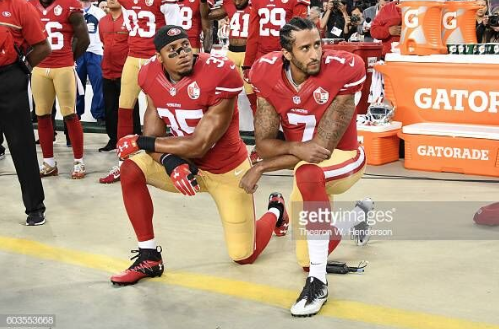The Tainted Spectacle: The Super Bowl Half-Time Show
The Super Bowl is fast approaching.
The finale of a tough season of American Football, climaxing in the biggest entertainment display of the year (except maybe Eurovision).
But this year, unlike the super safe family friendly shows of the past, the Super Bowl is full of controversy. Not least because of the NFL’s recent actions as an organisation.
The ‘Take A Knee’ protests highlighting police brutality against black people were a revolution, making headline news across the globe.
It was led by Colin Kaepernick, who has since become the figurehead of a hate campaign by American “patriots” who blasted him for disrespecting the flag, the US of A and even American servicemen and women who risk their lives for freedom and liberty for all.
It is fair to say that despite becoming internationally applauded for starting such a huge movement, he has become a villain to many.
Since his contract with the San Francisco 49ers ended in March of last year, Kaepernick hasn’t been picked up by any other team in the league.
By essentially blacklisting him, the NFL has become the target of hate, this time from those supporting Kaepernick’s actions.
By not picking him up, owners of NFL teams are practically punishing him for his protests. In reality, it’s probably not because they disagree with him, it’s just that a lot of the people who don’t support him would probably make very good customers of game tickets.
He’s a PR nightmare, which made him the surprising figurehead of a recent Nike advertising campaign which received mass support (and caused a few angry customers to burn their trainers).
Owners of teams have not only made the NFL a controversial organisation to be part of, but they’ve also transformed the Super Bowl half-time show into a poisoned chalice.

No performer wants to align themselves with an at-worst racist organisation and an at-best an organisation that puts wealthy profit ahead of worthy protest.
Numerous acts like Rhianna and Cardi B have turned down the show, which was previously seen as an honour. Those who did accept the show have come under fire.
Maroon 5 will be joined by black rappers Big Boi and Travis Scott.
PJ Morton, the keyboardist of Maroon 5, said in a Billboard interview that there was conflict within the band on whether or not to perform, but ultimately the allure was too much.
“It’s something I’ve wanted to do my whole life. As a musician it’s the biggest stage you could ever play.” He said.
“I think we can perform for the NFL and the players can play for the NFL and we can support Kap (Kaepernick) at the same time.”
It’s a difficult position for the stars who have been offered the show, but equally difficult for those organising the event.
They face a choice; do they throw black performers into the pits for supporting an immoral organisation, or do they face the fire themselves and risk white-washing the show.
Controversy seems to be something that follows giant shows around like clouds in the age of social media.
Kevin Hart recently refused to apologise for alleged homophobic comments and subsequently won’t host this years Oscars. (Probably not a bad thing either, he is starring in a film about Monopoly. You want this man to host the Oscars?)
Organisers have to be aware of controversy like never before.
Catherine Riozzi studies events management at the University of Greenwich, and says it is difficult to teach people to be aware of controversy.
“It’s so tricky because things can snowball instantly with social media.
“You can’t teach what will be controversial.
“You’ve got to use common sense.”
Those organising the half time show have probably never kicked a football in their life.
The half-time show has become such a huge event in and of itself that compared to the Super Bowl, it has to be squeaky clean.
It begs the question: Do football fans care?
Luke George, a Denver Broncos fan who has travelled transatlantic to see the Super Bowl live twice, doesn’t.
“It’s not really important for us, it’s more of a business attraction for people to get enticed into the sport.” He said.
“I care about the sport and match at the end of the day.
“However, I can recognise the shows importance to the company, it’s a huge stage for performers and brings a lot of money into the NFL.”
We are still weeks away from the actual game, and there are still the equivalent of semi-finals to be played.
But the half-time show is still dominating headlines, before we even know what that will entail.
There’s a risk of protests during the game, but none are confirmed yet. In fact, very little is confirmed.
The Super Bowl is such a huge event that brings so many different demographics together (sports fans, entertainments enthusiasts, corporations looking to soak up those sweet ad spots) that no one will ever be 100% satisfied.
But with the world of social media, there will be a 100% chance of outrage, deservedly or otherwise.
Like Jon Ronson said in his book So You’ve Been Publicly Shamed?: “With social media, we’ve created a stage for constant artificial high drama.
“Every day a new person emerges as a magnificent hero or a sickening villain.”
Or as Twitter user @oJORDANJORDANo put it: “Worst half time everrrrrr.”

